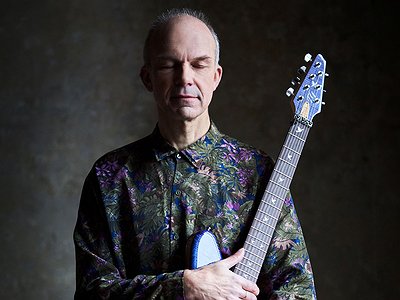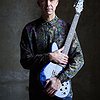Part 1
Name: Robert Jürjendal
Nationality: Estonian
Occupation: Guitarist, composer
Current release: Robert Jürjendal has just released a new album, Once Only, with Eternal Return, a quintet with Paul Godwin, Colin Edwin, Miguel Noya and Miguel Toro. Available from New Dog.
Recommendations: The Wounded Angel by Hugo Simberg, a Finnish artist
In The Search Of Miraculous by P.D. Ouspensky
2001 Space Odyssey – a movie by Stanley Kubrick
Lux Aeterna – a masterpiece by György Ligeti
If you enjoyed this interview with Robert Jürjendal and would like to know more about him, visit his website for further information.
We also conducted a conversation with some of Robert Jürjendal's partners in Eternal Return. Click here for a Colin Edwin interview or here for our Miguel Noya interview.
When did you start writing/producing music - and what or who were your early passions and influences? What is about music and/or sound that drew you to it?
I started quite early with simple sound experiments and recordings at the end of the 70's with my tape recorder at my home in a small town Võru, southern Estonia. I was probably around 10 this time, without any knowledge about music. But the call of music was so strong I couldn't refuse.
My father had a nice vinyl collection, mostly latin dance music which I liked to listen to very often. The radio was another great thing of the time because both live performances and LP-s of foreign artists were very rare (Estonia was sadly a part of USSR till 1991). I still remember listening to the Black Sabbath song “Over To You” for the first time through the messy filter like soundcloud because the signal of the radio was just so weak ...
Soon I started to learn classical guitar and my focus went more to the prog direction. I think I got a strong kick after listening to Yes's Going For The One One album. In the end I knew every bar of that album. As a young guy my interests moved dramatically from one corner to another. After the John McLaughlin Mahavishnu Orchestra I discovered British punk culture. Soon, probably in sync with the age I was back in the more serious music world, listening to Focus, Jeff Beck, Robert Fripp and many many others.
For most artists, originality is first preceded by a phase of learning and, often, emulating others. What was this like for you? How would you describe your own development as an artist and the transition towards your own voice? What is the relationship between copying, learning and your own creativity?
Somehow, emulating and copying other guitarists worked for me for a short period. Mostly because I understood quite quickly my own limits and possibilities. My interest in music has always been wide and full of curiosity, it has taken years to find out my own personal path.
In 1992 I participated in my first Guitar Craft Courses in Germany, instructed by Robert Fripp. This was probably the most important decision in my life – beside the very intense learning process I discovered that the guitar is really my instrument . Even then, after the courses, I was more interested just in groovy, pattern based music rather than in only a guitar itself. Searching for the balance between traditional and experimental, acoustic and electronic music has carried me to weird areas … It's dealing between being both a composer and guitarist. And that's why it's hard for me to talk only about guitarists and guitars. It happens that sometimes I'm much more amazed by the beauty of choir music, for example.
What were your main compositional- and production-challenges in the beginning and how have they changed over time?
I studied composition at Tallinn's Georg Ots Music School. The sign of a perfect composition was a well designed score which had to look good on paper. Soon I discovered that there is a big difference between the “paper work” and my live recording sessions which also often ended with a form of composition.
Frankly, both methods are still in my practice. It just depends very much on the music I'm creating. I don't need a written score for the music I'm performing/producing myself because it stays in my memory. I have been using academic scoring for more sophisticated commissioned works by different ensembles and choirs. Sibelius software with a Note Performer audio works pretty well. But I still never trust just the computer - that's why I'm moving between real instruments (guitar, piano) and computer. Working with my guitar/electronics is a little bit similar - it happens quite often that I'm taking an acoustic guitar to get into the basics.
In my sound oriented music I never use a computer as a compositional tool. I have to carry the academic compositions in my mind to the performance place using a lot of imagination. With my improvisational, sound oriented guitar music I'm much closer to the final picture.
What was your first studio like? How and for what reasons has your set-up evolved over the years and what are currently some of the most important pieces of gear for you?
My first studio was a Zoom Handy Recorder H2. (laughs) I used to make with this tiny recorder a whole soundtrack for the Estonian documentary “Measure Of The Man”. I played and mixed everything in real time, using different loopers and effects, stepping there and back. Finally, all the music was recorded on a 2 track stereo file and it sounded absolutely great! I think it was a turning point in my life because I realized that I had found a principle of working without a computer.
Right now I'm recording with ZOOM LiveTrack L20 , a multitrack recorder which is designed basically for band rehearsals and live recordings. I'm really enjoying the recording process without looking at the screen, just trusting my ears.
I put a big effort into my pedalboard which at the moment is basically divided into 3 sections: a) my main guitar signal through several effects into POD 500x b) Roland GR 55 c) Roland Vg8. Roland US-20 seIector allows users to switch between those two Roland machines or use them both simultaneously. Recently I ordered my very first custom electric guitar - TG Bluebird RJ-7 model which is fully equipped. Besides the magnetic pickup it also has a Sustainer pickup, piezo pickup and and the synth pickup. The guitar and pedals are now in a good relationship – both are quite complicated. (laughs) I really love this instrument and I'm thankful to Kalle Tombak and his Tombak Guitars.
There are some interesting pedals in my gear – for example the Gamechanger Plus Pedal, which is rather an organ-like instrument. Some years ago, I discovered Neunaber Audio effects. I like their natural and spacious Wet Reverb which always forms the end of my chain. Right now I'm discovering the hidden possibilities of BOSS DD-500, a wonderful machine.
How do you make use of technology? In terms of the feedback mechanism between technology and creativity, what do humans excel at, what do machines excel at?
I think that we have reached the point where something really interesting and new in technology is hard to find. The problem is that the early effects were designed mostly by musicians/technicians who operated close to music performance. Thanks to this, the equipment was made in purpose of making new and creative music. Nowadays we, as musicians, think too much about the technology itself, without a clear aim what to do with it.
If somebody is playing and my first impression is hearing the Strymon Big Sky, which is a nice tool, and only after that will I notice the player then something is wrong for me ... I begin to miss personality. If you listen to Jimi Hendrix you don't think so much about the Wah-wah pedal, even though he used this a lot ... Also, I don't believe that better technology produces always better music. There are fantastic albums from the past which I still esteem very highly.
Production tools, from instruments to complex software environments, contribute to the compositional process. How does this manifest itself in your work? Can you describe the co-authorship between yourself and your tools?
The question for me is how to use technology without reducing the musician's personality, creativity. Is this my personal sound or is it just the sound of the machine? If I'm fine with the sound of the machine, I'll try to create music in which this machine has to prove itself. I wish to have a challenge.
I agree that my music is very much related to the particular effect pedals I'm currently using. Because I'm a curious person, I'm always looking for a new pedal or effect to create new music. This principle works mostly well but it's quite expensive and you can never get rid of your older stuff if you wish to revisit your previous stuff.
Considering the co-authorship of me and tools, I think the tools have the same value as instruments. They have a considerable impact on the whole writing process and production. But the tools still need us, humans to push the knob.






